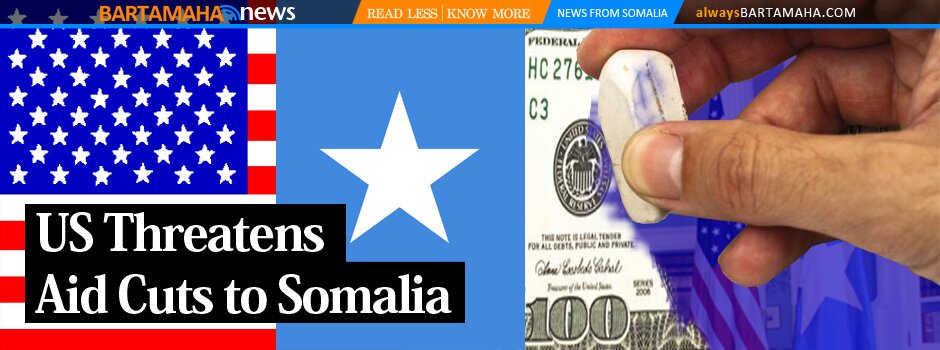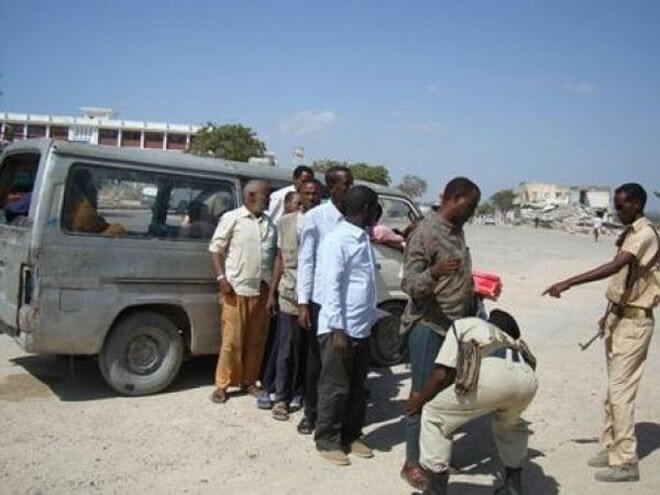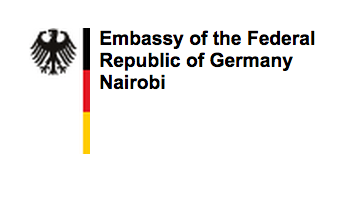Somalis Face a Snag in Lifelines From Abroad
 NAIROBI, Kenya — Compared with the trillions of dollars flowing through the international financial system every day, the estimated $1.3 billion sent each year from small storefronts in Somali neighborhoods in places like London and Minneapolis to families back home in the Horn of Africa is a mere droplet.
NAIROBI, Kenya — Compared with the trillions of dollars flowing through the international financial system every day, the estimated $1.3 billion sent each year from small storefronts in Somali neighborhoods in places like London and Minneapolis to families back home in the Horn of Africa is a mere droplet.
In a country where 40 percent of the population depends on remittances from relatives abroad, however, these transactions are a lifeline. And because Somalia has little in the way of financial infrastructure, the money transfer companies that make them possible play a central role in keeping the financial ties to the diaspora open, a few hundred dollars at a time.
But in an echo of politically charged fights over aid that have vexed Somalia before, the same money transfer services that help keep children in school and elder relatives off the streets also can be used to send money to help finance dangerous groups like the Shabab, the feared Islamist militants who once controlled much of the country.
Humanitarian groups, politicians and Somalis themselves are now sounding the alarm over plans by the British bank Barclays to suspend the accounts of a number of money transfer companies used to send money to developing countries — rather than risk a run-in with regulators over potentially abetting the financing of terrorists or money laundering.
“Millions of people depend on the remittances from outside,” said Shukri Ismail, one of the founders of Candlelight, a nonprofit in the northern region of Somaliland. “If those remittances stop, it will be literally chaos.”
The looming cutoff, expected to occur next Saturday, comes at a time when more and more Somalis have returned from abroad to invest in their home country, build new businesses and jump-start the nation’s economy after years of chaos. In June, the International Monetary Fund established relations with Somalia for the first time in more than two decades.
Last week in Mogadishu, the capital, Somalis lined up at a branch of Dahabshiil, the largest money transfer business in Somalia and one of those facing a shutdown by Barclays. It was busier than usual for the Ramadan holiday.
A cutoff would be “a disaster and result in a new phase of hunger and famine,” said Abdinasir Jamal, who relies on money from his sister abroad to survive.
Activists, academics and politicians in Somalia and abroad have asked the British government to intercede with Barclays. In June, the Somali president, Hassan Sheik Mohamud, appealed directly to the bank in a letter to keep the money transfer businesses’ accounts open.
Mo Farah, the British Olympic gold medalist born in Somalia, has lent his celebrity to the cause, asking for a 12-month extension before the cutoff. “Everyone following the issue understands that Barclays has a bank to run, but this decision could mean life or death to millions of Somalis,” Mr. Farah said in a statement.
The move by Barclays would affect not just Somalia but also countries like Bangladesh, Nigeria and Haiti. But Somalia is uniquely exposed because decades of violence and chaos have left it without a functioning banking system. If the money transfer businesses are shut down, experts say, the transfers will not go through other official channels but will be driven underground instead, making it harder to track money going to militant groups.
“The alternative is bulk cash smuggling, carrying suitcases of cash across the border from other places,” said Jonathan Schanzer, the vice president for research at the Foundation for Defense of Democracies and a former terrorism finance analyst at the United States Treasury.
“If you’re trying to assist people on the ground in Somalia, you have to work with the same remittance houses that are committing violations and assisting groups like Al Shabab,” Mr. Schanzer said.
When the militant group’s clandestine division needed money to pay for a planned wave of assassinations of government officials late last year, the Shabab turned to supporters in the Somali community in Qatar for donations. Shabab operatives used Dahabshiil to send the funds back to Somalia, according to a United Nations report.
Many major American banks have already stopped working with Somali money transfer businesses. In May, a federal court in Minnesota sentenced two women to prison for sending money to the Shabab.
The problem of keeping resources out of the Shabab’s hands has bedeviled Somalia and its donors before. In recent years the United States, concerned that some Somali contractors working for the United Nations were diverting food and money to the Shabab, suspended millions of dollars of food aid, prompting an outcry from United Nations officials who said the decision cut rations to starving people.
“Leakage to Al Shabab is the cost of doing business in Somalia,” said a diplomat involved in Somalia issues.
Anne-Marie Schryer-Roy, a spokeswoman for Adeso, a humanitarian and development organization active in Somalia that has used money transfer businesses, including Dahabshiil, to distribute money in the country, said, “There’s no equivalent to Citibank that could receive those funds and distribute them.”
Western Union has only one office in Somalia — in the relatively stable Somaliland. Elsewhere, Somalis turn to companies like Dahabshiil, which operates in 286 locations around the country.
Abdirashid Duale, Dahabshiil’s chief executive, said his company had worked with Barclays for 15 years without incident. “We’re asking them to be fair and transparent,” he said. “We have never committed any violations or assisted any extremist groups.”
Barclays has come under pressure because it is one of the last banks in Britain providing services to the money transfer businesses. Efforts to find a new bank to work with have proved fruitless, Mr. Duale said, arguing that Dahabshiil follows compliance rules, requires identification and puts customer data through watch lists.
Barclays defended the action as a necessary compliance step. “It is recognized that some money service businesses don’t have the proper checks in place to spot criminal activity and could unwittingly be facilitating money laundering and terrorist financing,” the bank said in a statement. “This is solely about the company’s controls.”
Last December, the bank HSBC had to pay the American government a record fine of $1.9 billion to settle charges that it had worked with Saudi Arabian banks linked to terrorist organizations, enabled Mexican drug cartels to launder money and transferred money to nations under American sanctions. Last August, a New York regulator warned that he might revoke Standard Chartered Bank’s license after accusing it of helping Iran avoid sanctions.
Barclays has already been working to extricate itself from a series of scandals. Last year, the bank reached a $450 million settlement over the manipulation of benchmark interest rates, and it still faces an investigation into payments by Qatari investors in 2008 at the height of the financial crisis.
The British government is “looking to really back the new government of Somalia with one hand, and the unintended consequences of these regulations is you could throw a lot more people into crisis,” said Ed Pomfret, Oxfam’s policy manager for Somalia. He said that while criticism had focused on Barclays, it was government regulators who needed to make changes to protect the businesses. “The regulations are basically defeating themselves,” Mr. Pomfret said.
Ken Menkhaus, a professor of political science at Davidson College in North Carolina, said Somalis would find a way to get money back home eventually.
“They have hundreds of creative ways of moving money, but it will be less efficient, it will be costlier,” Mr. Menkhaus said. “If Somalis start doing everything under the table, that’s bad for us, bad for them, bad for everybody.”
__
NYTimes
Comments
comments
 Calendar
Calendar






































